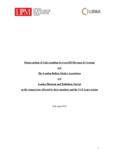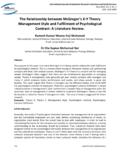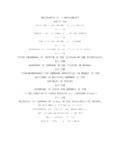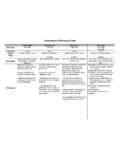Transcription of There is a Relationship Between Systems Thinking …
1 There is a Relationship Between Systems Thinking and W. Edwards Deming sTheory of Profound from the writings of W. Edwards DemingBy Barbara Berry, The Berrywood Group, Incberrybk@berrywood .com 918-496-3217Dr. Barbara BerryThe Berrywood GroupDeming s theory of profound knowledge is a management philosophy grounded in Systems theory. It is basedon the principle that each organization is composed of a system of interrelated processes and people whichmake up system s components. The success of all workers within the system is dependent on management scapability to orchestrate the delicate balance of each component for optimization of the entire believed profound knowledge generally comes from outside the system and is only useful if it is invitedand received with an eagerness to learn and improve.
2 A system cannot understand itself without help fromoutside the system , because prior experiences will bias objectivity, preventing critical analysis of theorganization. Critical self-examination is difficult without impartial analysis from outside the organization. Also,insiders can rarely serve as hostile critics who speak frankly without fear of to Deming, the journey from the prevailing management style to quality requires the understandingof Systems . A system is composed of interrelated components. Quality is the optimization of performance ofthe components relative to the goal or aim of the system . Individual components of the system will reinforce,not compete with each of the other components of the system to accomplish the aim of the , a lack of clearly defined purpose is common in organizations, particularly long-rangepurpose.
3 Short-term Thinking , quarterly and annual performance evaluations, and bottom line Thinking forcesattention to quick-fix solutions. Even if long-range plans exist, prevailing short-term Thinking distracts fromlong-term behavior toward real is a systematic process. First, establish the aim: vision, mission, goals or constancy of purpose of thesystem According to Deming, without aim, There is no system (Identity) then identify the components andprocesses and the interrelationships of the components within the system (relationships). Constantly improveon the processes of the system (Information/Learning/Knowledge.) There is a close similarity to self-organization in complexity science and Deming s components of asystem listed journey requires leadership with Profound Knowledge as a guide.
4 Leadership is marked by adedication to scientific knowledge as truth, as well as to the process of serving those whose followersdepend on the leader. A leader, who practices win/win negotiations, is trusted and trusts others to actresponsibly when empowered. Leaders are responsible for providing clearly defined purpose andmargins, shared vision, quality resources and delegating responsibility, (That is similar to BoundedInstability in Complexity Science)Profound Knowledge is made up of four interrelated components: Appreciation of a system Theory of knowledge The psychology of change Knowledge about variationThe four components cannot be separated. Knowledge of psychology, variation, theory of knowledge andappreciating the processes of a system must be managed with a delicate balance.
5 They make up of a system :A system is complex. It is made up of interrelated components of people and processes with a clearly defined,shared destination or goal. Everyone must share a distinct understanding and commitment to the aim orpurpose of the of a system depends on quality leaders understanding the interconnectedness andinterdependence the interconnectedness must be clearly defined and documented for successful flow orcontinuous improvement of the of a system can occur when all interconnecting components are orchestrated to achieve theorganization s goal. The people, free of fear and competition within the system can band together foroptimization of the system . In a quality system , everybody gains. The traditional management by objectives philosophy fails to orchestrate the components, leaving each one to do a job separate from the othercomponents and often causing them to work against the successes of one component may seek its own reward without destroying the balance of the system .
6 Each component isobligated to contribute its best to the system as a whole. In all negotiations the results must be flow chart can be used to clearly illustrate the components of a system and their interconnectedness. It can serve as anorganizational diagram. Each person must understand their job, know how to do it well, and understand the interdependentrole he/she plays with the rest of the system . Using flow charts, people can see how each person s is interrelated toaccomplish the organizational aim for the good of all. (Today we use Systems dynamics modeling to illustrate that clear view tothe members of the system .)Competitiveness within the system leads to loss for the system . Each component works interdependently with the PSYCHOLOGY OF CHANGEThe system self-organizes around its Identity.
7 That includes its vision, purpose, guiding principles,values, history, theory of success and shared aspirations. A clearly designed, shared identity allowsthe organization to self-organize in alignment with the identity desired by leadership. All Systems arecomplex adaptive Systems which adapt around their identity. The identity may be designed by leadership or itmay occur without design, more by accident. If it is allowed to occur accidentally it will lack clear, shareddirection. Thus empowerments will not be fully new style of leadership is required in Complex adapting organizations. This style is one in which the leaderserves their people with vision and guidance to see the interconnectedness of the whole system . The leadersmust first gain and communicate a shared identity and then be able to allow the organization ownership of thatidentity.
8 The leader serves the people with clear vision and guidance to empower them. To be empowered isto share ownership in the resistance to change is strong because everyone feels devalued. Resistance is diminished wheneveryone shares in the identity and understands the benefits of change. By adapting and developing new skillspeople feel their value increase, they have ownership in the change. People are born with intrinsic motivation, self-esteem, desire to learn, creativity and joy inaccomplishment, and a need for freedom and belonging. Early experiences may diminish self-esteem, butsuccessful accomplishments serve to improve it. Giving people a certain degree of control over their workfulfills the need for freedom and provides opportunity for taking joy in work.
9 Teamwork and loyalty to the workplace satisfies the need to style Thinking has lead to management styles of command and control. The industrial age influencedthe workplace and schools to encourage individual completeness, absolute authority, and one-right answer3thinking. A change in philosophy requires unlearning industrial Thinking evident in departmentalization,scarcity of knowledge and information industrial model discourages creativity and cooperative skills. Therefore, training in creativity,communication and interpersonal skills may be necessary. Opportunities to understand the means of leadingchange are readily available through a wealth of literature, seminars, and consulting learn differently. Each person has a unique set of experiences which shape learning.
10 Managing peoplefor optimization of performance requires an understanding of those differences. Common management theoryoperates on the theory that everyone learns alike. Common theory also acts on the assumption thatmotivation is extrinsic and influenced by external forces of reward or punishment and fear. Consider theinappropriateness of this way of Thinking , and the false assumption that motivation is extrinsic. The humanbrain is designed to learn and achieve, it actually produces a chemical reaction to successful performance thatserves as and internal reward in itself ---intrinsic OF KNOWLEDGE The theory of knowledge, as stated here, implies that system improvement depends on continuous study ofthe organization. Improvement is learning and developing new knowledge about the system .







